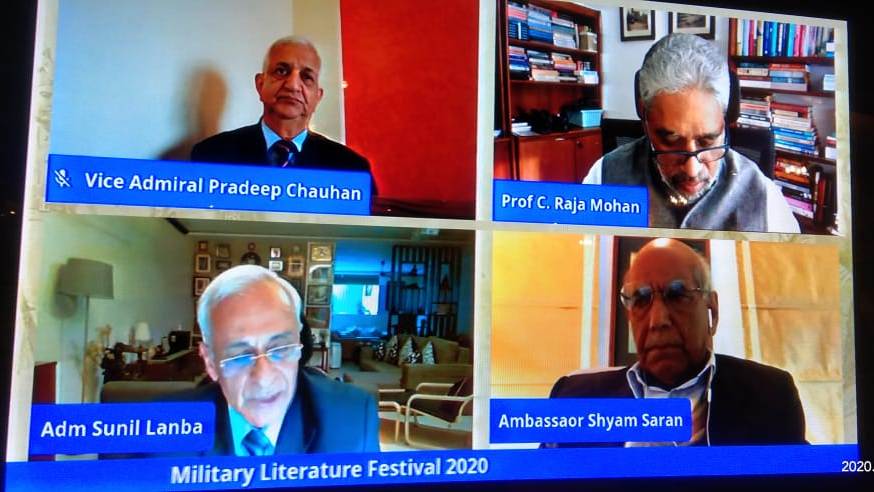CHANDIGARH, DECEMBER 19: Underlining its brazen military manoeuvres and the unprecedented scale of challenge from China, security and foreign experts on Saturday suggested India must adopt a more aggressive demeanour to forge issue-based geo-strategic multilateral partnerships like QUAD to leverage India’s full potential in checking the dragon in its rank.
The views were expressed by star-studded group of top panelists including our former Navy Chief Admiral Sunil Lanba (Retd.) during a substantial exchange held virtually during the second day of MLF 2020 on ‘The QUAD: The Emerging Indo-Pacific Naval Alliance’.
Sharing his thoughts during the discussion, noted defence commentator and Director Institute of South Asian Studies National University of Singapore Prof. C Raja Mohan averred Delhi must learn from the past in not letting the academic debates about alliances tar its judgments about extraordinary economic and security challenges staring India.
India faces growing threats and it needs more partnerships than it has ever needed before globally, Raja Mohan said while pointing out India’s traditional reluctance to be an active QUAD partner due to fear of being perceived as taking a side.
Underlining the changed global scenario where India cannot remain neutral anymore, as has been our policy till now, he said that we have to move on much faster on multiple fronts while strengthening QUAD, and enhancing other regional mechanisms.
The way China threatens us today requires us to dynamically improve national economic capacity, not only the military capability, in partnerships with intensive international coalitions for which QUAD could be the central fulcrum for the time being.
Moderating the discussion, former Navy Chief Admiral Sunil Lanba (Retd.) expounded on the genesis of Quadrilateral Security Dialogue or Quad as a club of four nations comprising India, US, Japan and Australia which was mooted by then Japanese Prime Minister Shinzo Abe in 2007. Forged in wake of coordination amongst these 4 democracies during the 2004 Tsunami, the ambitious grouping went into limbo owing to Australia’s reluctance to antagonise China then. It’s prominence in 2017 has been a response to China’s assertiveness in the region.
Taking part in the deliberations, Career Diplomat and Former Ambassador Shyam Saran who was the Foreign Secretary during 2004 when Tsunami had struck Indian shores recalled great acknowledgment India had received from foreign nations for its swift action by our naval forces. Dissecting the real reason for QUAD’s retreating into limbo after 2007, Saran revealed that it was US which in fact had wanted to play down group’s significance because it did not want to loose out on China and Russia’s support for pushing Iran Nuclear Deal.
Marking out reasons for revival of QUAD, he said the challenge posed by assertive China to India and other countries including Japan and Australia as the immediate trigger has rightfully reinvigorated the grouping. Besides, the security relationships between these four countries are much equal, he added.
Echoing the sentiment that QUAD is not just only a naval alliance, Vice Admiral Pradeep Chauhan said China considers India as one of its target of military assertion, a challenge our establishment has so far not been familiar and comfortable dealing with it. We need to have a nimble asymmetric strategy and must maneouver our strengths to best of our capabilities in thwarting China, he added.
Pointing out that China has been weaponising its economic prominence to saddle other countries, adding India can’t be choosy while entering alliances, while referring to RCEP. The decision of India to stay out of RCEP which he termed incorrect is not in line with keeping the high ambitions to match geo-strategic goals. We need bold steps across the board to counter rising China, he added.
Expressing satisfaction at the pace of reviva, Saran said India has moved to crystalise the accord but more participation will be better for future course, possibly alluding to ASEAN member countries.
Cautioning against singing out China, he said it would be in best interest of China to be a part of the alliance as capabilities of all four nations have the potential to act as a counterweight to dragon.
Pointing out that QUAD future trajectory would depend on China’s stance, the former ambassador reiterated India should be less hesitant in taking QUAD forward and must always aim to create a propitious environment for QUAD to be more powerful.

 हिंदी
हिंदी






